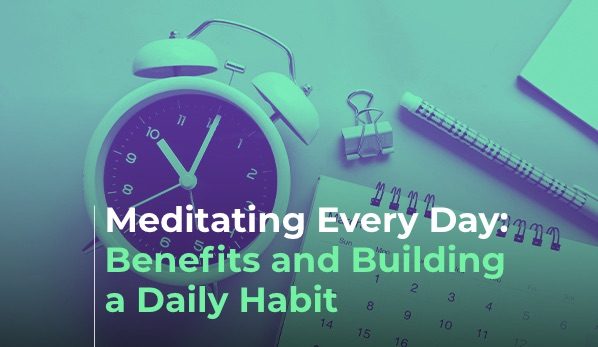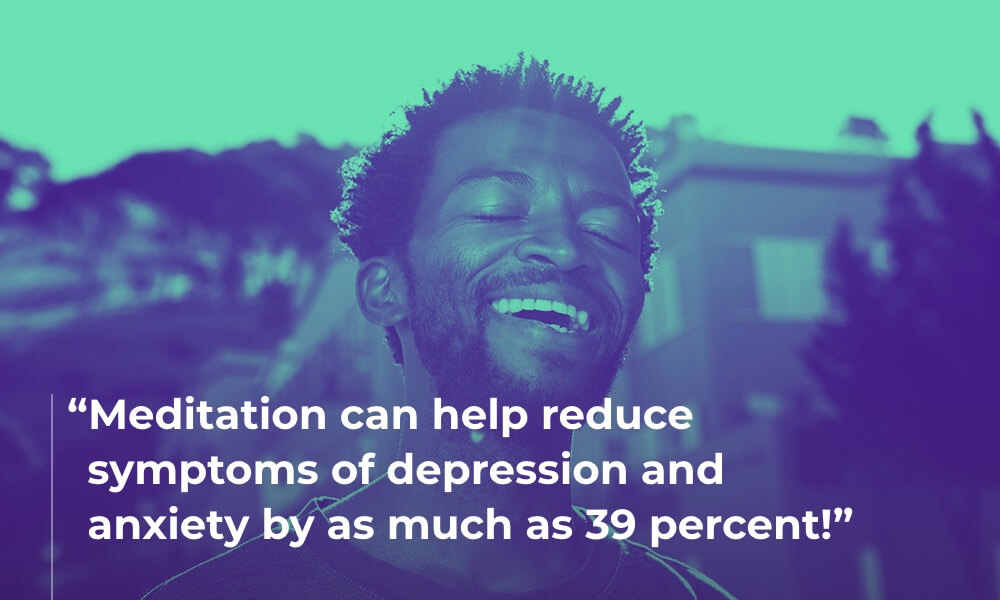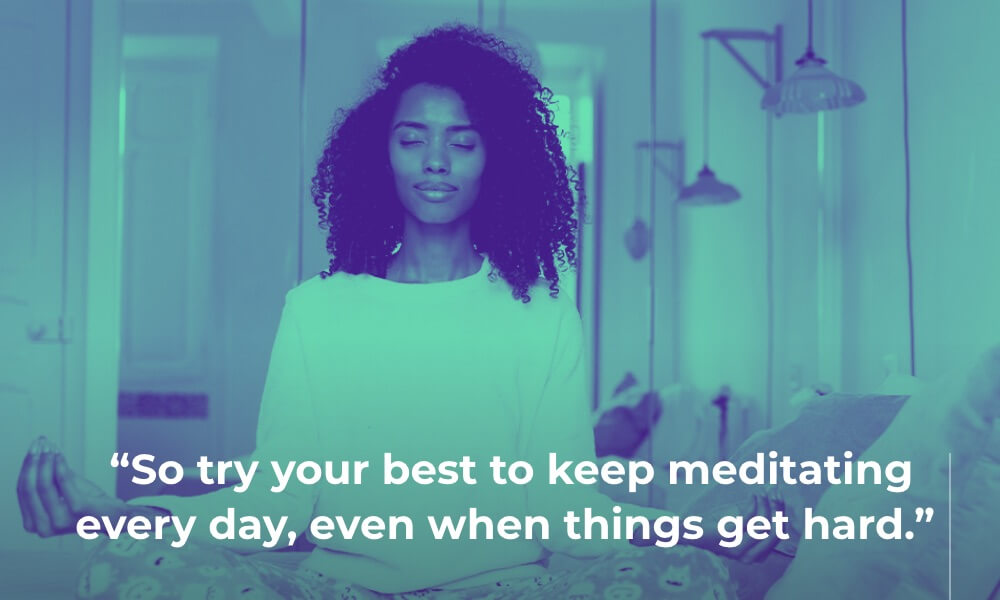Meditation can improve memory, reduce stress, improve relaxation, increase your ability to process emotions, and much more. Meditation can even help you focus and be more productive!
In this article, we explore why you should meditate daily and the good things that happen when you make everyday meditation a habit. We also talk about the science-backed benefits of daily meditation and mindfulness.
If you’re having trouble or need encouragement starting your everyday meditation practice, you’re in the right place! We share some of our favorite tips and tricks for forming a daily meditation habit (including the one can’t-miss tip we recommend to everyone who’s serious about starting their practice). Plus, we get candid about whether everyday meditation is a must and what you can do when you miss a day. Let’s get started!
The Main Reasons You Should Meditate Every day
Small habits, like exercising and eating well, can make a tremendous impact on our physical health. But what about our mental health? The reality is that most of us need to do a little bit more to care for our minds.
This is where everyday meditation comes in. No different than brushing your teeth, meditation is a form of hygiene—mental hygiene.
Daily meditation helps keep your brain healthy. In fact, one study shows that it can rewire your brain to be more focused and aware in just eight weeks.
Just like most healthy habits, meditation is best used for prevention rather than as a cure. Everyday meditation can drastically reduce your risk for a variety of issues like anxiety and depression. And, if you’re not prone to those types of issues, meditation is also helpful for preventing good old-fashioned everyday stress. Plus, daily meditation can also be critical for improving your relationships with colleagues, family, friends, romantic partners, and, most importantly, yourself.
Sitting with your breath for a small amount of time each day (even just 5 to 20 minutes) can positively influence your mental, emotional, and physical health. And more people are catching on to how impactful daily meditation can be. It may be time for you to get on board too!
What Happens to Your Body When You Meditate Daily?
In Western society, there’s still a pervasive belief that your mind and body function as somewhat separate entities. But the reality is that the way we treat our bodies impacts our minds, and the way we treat our minds impacts our bodies.
Unfortunately, many people first see evidence of this connection under negative circumstances. For example, when too much stress causes a head cold or when nervousness leads to an upset stomach. But the good news is that your mind can impact your body in positive ways, too.
There’s an abundance of evidence that shows that positive thinking can improve your health. And there’s no shortage of anecdotal evidence from people who have used their mindsets to reduce chronic pain, improve their immune systems, and heal their bodies.
Thankfully, there’s a well-charted path for using your mind to positively impact your physical health, and it lies in meditation.
Everyday meditation can help prevent some of the most physically damaging emotions that result from living in our modern world. For example, daily meditation is proven to help you reduce your day-to-day stress.
This stress reduction helps mitigate the dangerous, inflammatory effect that cortisol (the stress hormone) can have on your body. Just like stress, other negative emotions (like worry, anger, resentment, and fear) abound, but meditation helps loosen their grip. By helping you accept these feelings, rather than fight them, meditation helps you alleviate the damage they may otherwise cause.
Meditation can also assist with physical ailments not caused by emotions. In fact, meditation is proven to help lessen the symptoms of fibromyalgia. Mindfulness meditation improves both the painful symptoms of fibromyalgia and lessens the brain’s perception of the pain. It’s also shown to help those living with irritable bowel syndrome, insomnia, acute pain, and high blood pressure. A specific type of meditation called transcendental meditation has even been shown to combat coronary heart disease.
Daily meditation can help you reach physical health goals too. It can improve your self-control, reduce your tendency to eat emotionally, and help you lose excess weight. With a healthy brain, there’s little you can’t do! And meditation helps you get there.
There’s no reason not to add meditation to your everyday life.
What Are The Benefits of Everyday Meditation?
Of course, the rewards of this practice extend beyond just the physical. There are plenty of benefits to be had for your mind, too.
Meditation can help reduce symptoms of depression and anxiety (by as much as 39 percent)! Plus, it can help lessen one of the primary contributors to these disorders: negative thinking. Meditation can also help you process difficult-to-handle emotions (such as feelings of aggression.)
If you’re struggling with addiction or post-traumatic stress disorder, daily meditation is proven to help here, too. And once you start meditating, the results just keep coming. In fact, one study found that meditators saw lasting cognitive gains from their practice, even seven years after they started meditating.
Do You Need to Meditate Every day?
Even if you’re aware of the nearly endless health benefits of meditation, it can be hard to find the motivation to do it every day. So you may be wondering if you really need to meditate daily to reap the benefits of meditation.
To understand the answer to this question, it’s helpful to think of meditation like you would think of any other healthy habit, such as exercising. Even just one day of exercise makes a positive contribution to your overall health.
Meditation has a compounding effect: the more you do it, the better you’ll get at it. (And the more strange you feel when you don’t do it!) Plus, the better you get, the more benefits you’ll receive. That said, even infrequent meditation can help center you in the present moment and reduce the severity of any negative emotions you may be feeling. Five minutes of meditation a week is exponentially better than zero.
The ideal meditation schedule is whatever works for you, but if you’re looking for a guideline, 5 to 20 minutes is a good time frame to start. And you can always increase your time from there if needed. Don’t feel like you need to continually extend the length of your meditation sessions, though. Most experienced meditation practitioners still keep their daily meditation practice to an hour or less.
If you’re worried about meditating too much, don’t be! Unless you’re meditating for hours upon hours each day, you’re not likely to come across any issues or side effects.
How to Form a Daily Meditation Habit
By now, you know that daily meditation benefits many aspects of your life. But you might be unsure how to meditate every day. Don’t stress! The following are some tips on how to make a daily meditation practice part of your life:
Start Small
Often, when we’re excited about making a change in our lives, we tend to go too big. We pledge to run a mile each day when really we need to start by consistently walking around the block. The same goes for meditation.
If it’s your first time giving this mindfulness practice a go, don’t start by assuming you’ll meditate for half an hour every day. If you do, you’re likely to experience meditation burnout. Instead, simply commit to five minutes of meditation per day and see what happens. Remember, you can always increase your time after you’ve developed a consistent habit.
“Tether” Your Habits
If you have trouble remembering to meditate, try “tethering” your meditation practice to a habit you already perform daily, like brushing your teeth, for example. With this method, you brush your teeth then meditate for five minutes. This “tethering” helps you ingrain the meditation habit in your mind.
Put It On Your Calendar
If you’re someone who likes to schedule their entire day ahead of time, try adding regular meditation to your calendar. The idea is that you’ve set aside the time, so you “have” to do it. Similarly, you can try setting an alarm on your phone or set a push reminder if you’re using a meditation app.
Make It a Non-Negotiable
Some things in your life may feel easy to cancel when you’re busy and overwhelmed, like a dinner date with friends. But chances are that non-negotiables like a doctor’s appointment or your child’s parent-teacher conference won’t be canceled, no matter how busy you get. So, try to make meditating daily one of your non-negotiables. After all, it’s one of the most beneficial things you can do for your health and well-being.
Have Patience With Yourself
Remember that you’re human, and you’re bound to make mistakes. That includes missing a day or two of meditation. Don’t beat yourself up over it! Similarly, try not to get upset when you catch your mind wandering during your meditation practice. Believe it or not, one of the best ways to stay consistent with your practice is to acknowledge your shortcomings without a lot of fanfare and then move on. You don’t need to invest any more emotion than that.
Don’t Abandon Meditation During Stressful Situations
When things get hectic and you feel overwhelmed, stressed out, fearful, or all of the above, you may be especially resistant to sitting down in silence with your breath. The irony is that this is the best time to meditate! You’ll see some of the greatest results when you meditate during these periods of unease. So try your best to keep meditating every day, even when things get hard.
Figure Out What Works For You
If you don’t know how to be a regular meditator, we have good news: There is no one way to do it.
There are many different types of meditation—from common practices like visualization to more unique choices like candle gazing!
It’s not a one-size-fits-all approach. And the more you experiment, the more likely you are to find the practice you’ll want to keep including in your daily routine. Create the optimal setting for a meditative practice. You’re a lot more likely to want to hang out in a room that’s comfortable and clean.
So it makes sense to create a similar environment for your meditation programs! Whether you’re dedicating an entire room to meditation or just a corner of your office, make sure it’s clutter-free and inviting.
Use a Meditation App
Our final and most highly recommended tip is to incorporate a meditation app into your wellness routine. Using an app is one of the best ways to stay consistent and, most importantly, stay inspired!
Many meditation apps track how many days in a row you’ve meditated, plus they often allow you to set push notifications to remind you to meditate daily. You can use a meditation app anywhere, even lying down in bed. Plus, meditation apps provide many different guided meditation practices, so you never get bored. This variety helps you return to meditation day after day.
Primed Mind is a guided meditation and hypnosis developed by one of the world’s leading mindset coaches. It helps you access the healing power of meditation from the comfort of your home. It’s easy to add to your daily routine, it’s free to download, and new meditation sessions are added to the app all of the time.
Plus, it can help you start your day in a good mindset, and it can help you work on specific goals, like improving your confidence, letting go of stress, or even sleeping better. Guided meditation can help improve so many aspects of your life—all without leaving your living room. Try meditating today to start reaping the rewards!





